新概念英语第二册74课课后习题详细答案
新概念2Lesson74Outofthelimelight
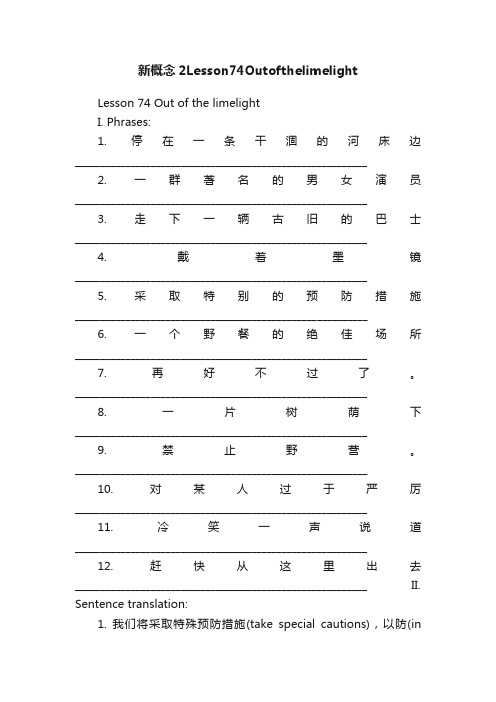
新概念2Lesson74OutofthelimelightLesson 74 Out of the limelightI. Phrases:1. 停在一条干涸的河床边__________________________________________________________2. 一群著名的男女演员__________________________________________________________3. 走下一辆古旧的巴士__________________________________________________________4. 戴着墨镜__________________________________________________________5. 采取特别的预防措施__________________________________________________________6. 一个野餐的绝佳场所__________________________________________________________7. 再好不过了。
__________________________________________________________8. 一片树荫下__________________________________________________________9. 禁止野营。
__________________________________________________________10. 对某人过于严厉__________________________________________________________11. 冷笑一声说道__________________________________________________________12. 赶快从这里出去__________________________________________________________ II. Sentence translation:1. 我们将采取特殊预防措施(take special cautions),以防(incase)被影迷和报纸记者认出来。
新概念英语第二册Lesson74详细内容讲解
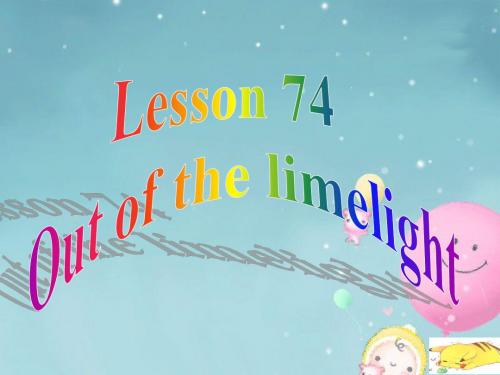
2.Dressed in dark glasses and old clothes, they had taken special precautions so that no one should recognize them.
take special precautions
采取特别的预防措施 目的状语从句
ask him to wait. 注意: in case引出的条件从句所表示的意义 是"预防某种情况的出现";如果从句说的是 一般的假设或条件,则要用if。
I'll tell him about the matter if I meet him. (不用
in case)
Take an umbrella in case it rains. (不用if ) 在上下文意义很明确时,有时可省去in case 后从句的内容:
4. Why don't we come more often?
同义句 = __W__h_y__n_o_t_c_o__m_e__m__o_r_e_o__ft_e_n_?__
Why not...? 是口语中常用的表达方式, 是Why don’t you do...? 的省略形式, 通常在提建议(advice)时使用。 Why +don’t/doesn’t +主语 +动词?
get out of here 从这里走开,滚出去,滚开
7. 'I'm sheriff here. Do you see that notice?
It says "No Camping" -- in case you
can't read!'
in case + 从句
新概念英语第二册课后答案第四十七课
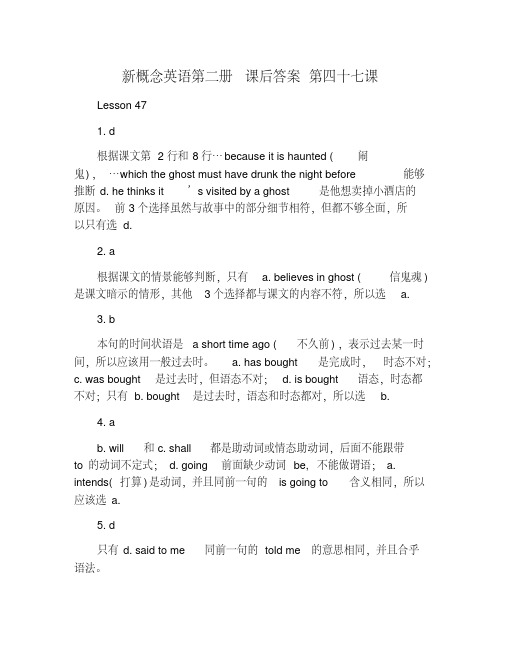
新概念英语第二册课后答案第四十七课Lesson 471. d根据课文第2行和8行…because it is haunted (闹鬼),…which the ghost must have drunk the night before 能够推断d. he thinks it’s visited by a ghost 是他想卖掉小酒店的原因。
前3个选择虽然与故事中的部分细节相符,但都不够全面,所以只有选 d.2. a根据课文的情景能够判断,只有 a. believes in ghost (信鬼魂)是课文暗示的情形,其他3个选择都与课文的内容不符,所以选 a.3. b本句的时间状语是 a short time ago (不久前),表示过去某一时间,所以应该用一般过去时。
a. has bought 是完成时,时态不对;c. was bought 是过去时,但语态不对;d. is bought 语态,时态都不对;只有 b. bought 是过去时,语态和时态都对,所以选 b.4. ab. will 和c. shall 都是助动词或情态助动词,后面不能跟带to的动词不定式;d. going 前面缺少动词be, 不能做谓语;a. intends(打算)是动词,并且同前一句的is going to 含义相同,所以应该选a.5. d只有d. said to me 同前一句的told me 的意思相同,并且合乎语法。
a. said me 和 c. told to me 都有语法错误,应该是said to me, told me ;b. talked to me(同我谈话)与told me 的含义不一样,所以选 d.6. a这是含定语从句的句子,需要选出准确关系代词和系动词。
b. who was 因为先行词不是人,所以不合乎题目意思; c. that is 和which is 都是现在时,与主句的时态不符;只有 a. which was 最合乎语法,所以应该选 a.7. a前一句中的must have drunk(一定喝了)表示对过去发生的事情的推测。
新概念英语第二册第74课 Out of the limelight 舞台之外
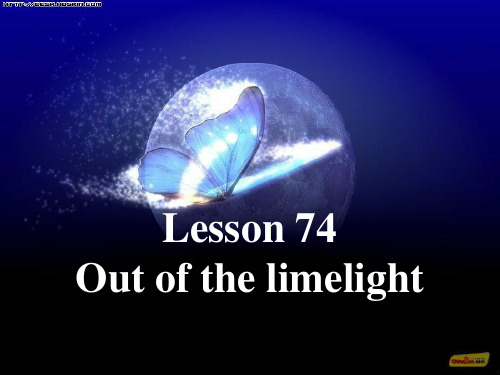
limelight precaution fan shady sheriff notice sneer
n. 舞台灯光 n. 预防措施 n. 狂热者,迷 adj. 遮荫的 n. 司法长官 n. 告示 n. 冷笑
Questions on the text
1.Where did the bus stop and who got off? The bus stopped by a dry river bed and a party of famous actors and actress got off. 2. How were the actors and actress dressed and why had they dressed like this? They were dressed in dark glasses and old clothes because they did not want to be recognized.
prescribe (v.) 事先写好的=规定/开处方
3. shade
Let’s sit in the shade and keep cool. Shady adj. 背阴的, 阴凉的 This is a shady avenue. 靠不住的, 可疑的 He’s a rather shady person.
1. so that VS so…that… I will speak loudly so that you can hear me. John is so honest that we all believe him. (结果状语从句)
2. so that VS in order that in order that可放句首 In order that we might see the sunrise, we started for the peak early.
新概念英语二册课后练习答案Lessons74
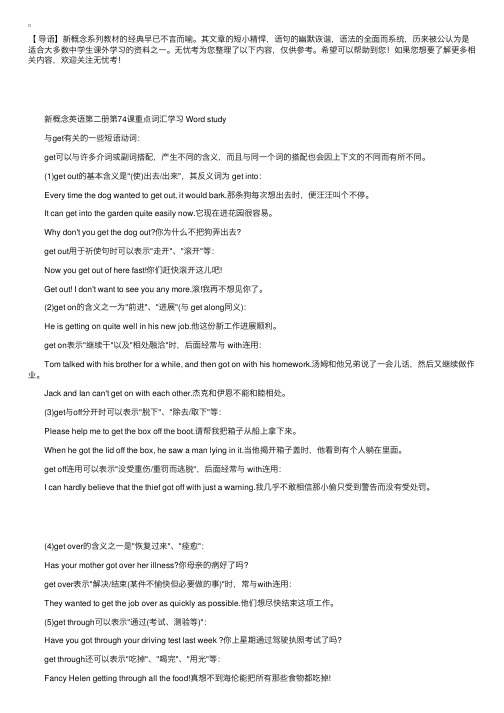
【导语】新概念系列教材的经典早已不⾔⽽喻。
其⽂章的短⼩精悍,语句的幽默诙谐,语法的全⾯⽽系统,历来被公认为是适合⼤多数中学⽣课外学习的资料之⼀。
⽆忧考为您整理了以下内容,仅供参考。
希望可以帮助到您!如果您想要了解更多相关内容,欢迎关注⽆忧考! 新概念英语第⼆册第74课重点词汇学习 Word study 与get有关的⼀些短语动词: get可以与许多介词或副词搭配,产⽣不同的含义,⽽且与同⼀个词的搭配也会因上下⽂的不同⽽有所不同。
(1)get out的基本含义是"(使)出去/出来",其反义词为 get into: Every time the dog wanted to get out, it would bark.那条狗每次想出去时,便汪汪叫个不停。
It can get into the garden quite easily now.它现在进花园很容易。
Why don't you get the dog out?你为什么不把狗弄出去? get out⽤于祈使句时可以表⽰"⾛开"、"滚开"等: Now you get out of here fast!你们赶快滚开这⼉吧! Get out! I don't want to see you any more.滚!我再不想见你了。
(2)get on的含义之⼀为"前进"、"进展"(与 get along同义): He is getting on quite well in his new job.他这份新⼯作进展顺利。
get on表⽰"继续⼲"以及"相处融洽"时,后⾯经常与 with连⽤: Tom talked with his brother for a while, and then got on with his homework.汤姆和他兄弟说了⼀会⼉话,然后⼜继续做作业。
新概念英语第二册74课课后习题详细答案

新概念英语第二册74课课后习题详细答案第一篇:新概念英语第二册74课课后习题详细答案新概念英语第二册课后习题答案详解Lesson 74 练习答案 Key to written exercises 1.关键句型练习答案B 1 are now investigating 2 travels 3 resembles 4 delivers 5 looks 6 loves 7 is coming 8 do you prefer C(sample sentences)1 This box is empty, but that one contains old papers.2 What does‘No Campming’mean? 3 I don't believe a word he says!4 I'm sorry, but I don't understand what you mean.5 They want(to buy)a new house.6 Don't hurry.It doesn't matter if we're late.2.难点练习答案a 1 over 2 into 3 through 4 off 5 on…with 6 on withb 1 No Smoking(in this compartment)2 No Parking 3 No Waiting on this side of the street today 3.多项选择题答案1.b 根据课文第2-3行,只有b.最符合课文内容,其他3个都不能说明这些演员化装的目的.2.d 根据课文最后一段…Oh, is it? ‟said the sheriff with a sneer……Now you get out of here fast!‟可以判断只有d.didn‟t believe that they were famous actors 是课文所暗示的情况,其他3个选择都与课文内容无关。
(完整版)新概念二册L74词汇练习答案
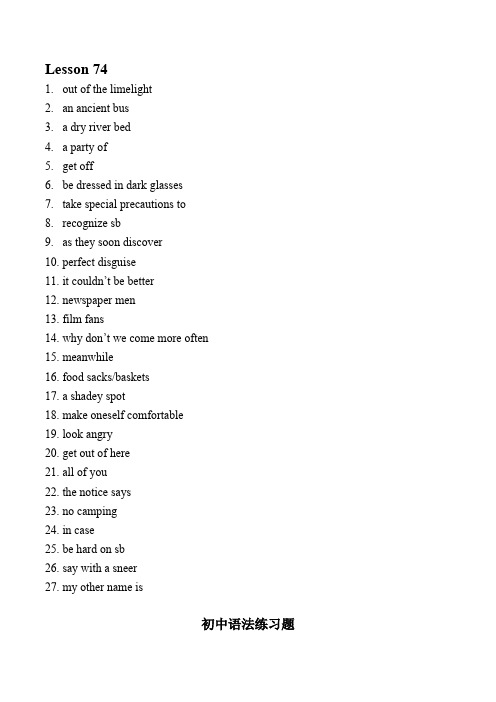
Lesson 741.out of the limelight2.an ancient bus3. a dry river bed4. a party of5.get off6.be dressed in dark glasses7.take special precautions to8.recognize sb9.as they soon discover10.perfect disguise11.it couldn’t be better12.newspaper men13.film fans14.why don’t we come more often15.meanwhile16.food sacks/baskets17.a shadey spot18.make oneself comfortable19.look angry20.get out of here21.all of you22.the notice says23.no camping24.in case25.be hard on sb26.say with a sneer27.my other name is初中语法练习题一选择题1. Miss Green isn't in the office. She____A___ to the library .A.has gone B. had went C.went D. has been2. I C 1000 English words by the time I was ten.A. have learnedB. was learningC. had learnedD. learnt3. My parents __A____ Shandong for ten years .A. have been in B. have been to C. have gone to D. have been4. He D in Beijing for six years. He in Shanghai now.A. lived; livedB. has lived; livedC. have lived; livesD. lived; lives5 C has Mr White been a member of Greener China since he to China?A. How soon, comesB. How often, gotC. How long, cameD. How far, arrived6. His uncle C for more than 9 years.A. has come hereB. had been hereC. has lived thereD. has left the university7. He C in the factory for three years before he joined the ArmyA. has workedB. worksC. had workedD. will work8 — I’m sorry to keep you waiting.— Oh, not at all. I ___A__ here only a few minutes.A. have beenB. had beenC. wasD. will be9. — D my glasses? — Yes . I them on your bed a minute ago .A. Do you see; have seenB. had you seen; have seenC. Would you see; sawD. Have you seen; saw10. I B from Henry for a long time.A. don’t hearB. hadn’t heardC. have heardD. haven’t heard11. My mother__C___ in that factory at the age of 18.A. had workedB. has workedC. workedD. works12. You don’t need to describe her. I __B__ her several times .A. had metB. have metC. metD. Meet13. It is the third time you __C__ late this week.A. had beenB. areC. have beenD. will be二填空题1. A. 用already或yet 1) Have they taken down the old pictures ___yet__? No, not ___yet_____. 2) Most of us have finished our compositions _____already___ 3) He said he hadn’t visited the exhibition _____yet___. B.用since或for 1) We have learned five lessons __since____ the beginning of this term. 2) Mrs Liao has been in hospital ___since___last week. 3) I have stayed at my aunt’s __for___two weeks. C. 用have gone或have been 1) Where are the boy students ? They __ have been___ to the school factory. 2) Is your father in ? No, he __has gone__ to Shenzhen. ___Has____he ever ___been___ there before ? Yes, he __has been_ there several times 3) He asked me if I___have been__ to Hangzhou before. I told him that I wanted to go there for a visit as I __have __ never __been__ to that city before.。
新概念英语第二册Lesson74分析解析
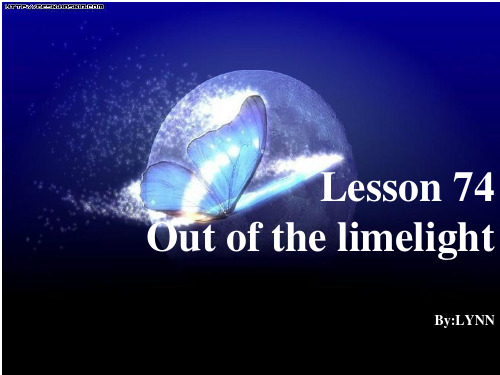
By:LYNN
Warming up
Do you know who is it ?
Bingbing Fan --an famous actress
Angelina Jolie
What do those famous
stars fear of ?
post-前缀,与名词,动词,形容词结合,表 示“在…之后”。
post date填上比实际晚的日期 post graduate研究生
fan
n.狂热者;迷(粉丝)
fan n.(口)(电影,运动等)迷,狂热爱好者(支持者)
a baseball fan 棒球迷 a rock‘n' roll fan 摇滚迷 eg.She is a great fan of the Giants. 她是巨人队的忠
色的侧面轮廓或剪影
sheriff
n.(美国) 司法长官 (英)郡长(任期一年);行政长官 (苏格兰)司法长官
notice
实球迷。
n.风扇 a folding fan 折扇 an electric fan 电扇
v.扇风,送风 fan a fire 扇火 eg.He fanned his face with a magazine. 他用一本杂志向连上扇风。
shady
adj.遮荫的 eg.Let`s walk along the shady side of the road.
precaution
n.预防措施 take precautions 采取预防措施 take precautions against... 对某事采取预防措施 take precautions against fire 采取防火措施 eg.I took cold pills as a precautions. 我吃感冒药预防感冒。 (cold pills 感冒药)
- 1、下载文档前请自行甄别文档内容的完整性,平台不提供额外的编辑、内容补充、找答案等附加服务。
- 2、"仅部分预览"的文档,不可在线预览部分如存在完整性等问题,可反馈申请退款(可完整预览的文档不适用该条件!)。
- 3、如文档侵犯您的权益,请联系客服反馈,我们会尽快为您处理(人工客服工作时间:9:00-18:30)。
新概念英语第二册课后习题答案详解Lesson 74 练习答案Key to written exercises
1.关键句型练习答案
B 1 are now investigating 2 travels
3 resembles
4 delivers
5 looks
6 loves
7 is coming 8 do you prefer
C (sample sentences)
1 This box is empty, but that one contains old papers.
2 What does‘No Campming’mean?
3 I don't believe a word he says!
4 I'm sorry, but I don't understand what you mean.
5 They want (to buy) a new house.
6 Don't hurry. It doesn't matter if we're late.
2.难点练习答案
a 1 over 2 into 3 through 4 off 5 on…with 6 on with
b 1 No Smoking(in this compartment)
2 No Parking
3 No Waiting on this side of the street today
3.多项选择题答案
1. b
根据课文第2-3行,只有b.最符合课文内容,其他3个都不能说明这些演员化装的目的.
2. d
根据课文最后一段…Oh, is it? ‟said the sheriff with a sneer… …Now you get out of here fast!‟可以判断只有d. didn‟t believe that they were famous actors 是课文所暗示的情况,其他3个选择都与课文内容无关。
3. c
前一句中的too perfect 意思为“过分完美”,本句需要找出与它含义接近的表达方式。
a. perfect 完美,
b. quite perfect 相当完美,
c. more perfect than is convenient(非常
的,超常的完美)
d. almost perfect(几乎完美的)中,只有c.同too perfect 的含义最接近。
4. c
本句是一个感叹句,需要一个合适的感叹词引导。
a. How 和d. How a 都不符合语法,因为它们不能修饰名词place; b. What 可以修饰名词,但是place 是可数名词,因此还应该有不定冠词a 才正确;只有c. What a 最符合语法,所以选c.
5. d
前面的句子中的Why don't 结构常用来提出建议,它的含义是"我们应该经常来",只有选
d. should最符合题目意思和时态,因为should是情态助动词,意思是应该,是指现在.而其
他3个选择都是过去式,他们的词意思和时态与前面句子不符合.
6. c
这一句中的No camping 意思是“禁止野营”,在公告牌上经常用这类省略句形式。
只有
c. you aren‟t allowed to camp (不允许你野营)与No camping 的含义相同。
而a. there
isn‟t any (没有任何什么);b. it‟s without camping (没有野营);d. you needn‟t camp (你没有必要野营)这3个选择都与No camping 含义不符,所以选c.
7. a
本句只有a. If(如果)最合乎语法和题目意思。
If 可以用来引导一个条件从句,从句用现在时,主句用将来时will, b. Providing that(以……为条件,假如)不如If 常用,而且仅用在非常正式的书面用语中,故不能选b.
c. Whether (是否) 不能引导条件从句,
d. In the situation(处于这种形势)是介词短语,
不能引导从句。
8. c
该句需要选出一个同前一句的clothes(衣着,服装)意义相同的词。
a. cloth(布,织物),
b. cloths(cloth的复数形式),
c. clothing(衣服,衣着),
d. dresses(衣
服)主要指某种场合穿的衣服,礼服。
只有c.最接近clothes的含义,所以选c.
9. b
该句需要找出与disguise (化装,伪装)含义相关的词。
a. computer (计算机),c. bus(公共汽车),d. train (火车)这3个选择都与disguise 无关。
只有b. mark (面具,掩盖物)与disguise 含义相关,因为面具是化装或伪装的一种手段,所以选b.
10. c
本句中的fan 是指“(运动、娱乐等的)狂热爱好者”,只有c. enjoys seeing 才符合题目意思,因为enjoy seeing 是“喜欢看”的意思,同fan 的意思相符,而其他3个选a. makes (制造),b. see (看),d. possesses (拥有)都与fan 的含义不相符。
11. a
本句需要选出与前一句中的notice (通告,招牌,标记)含义相同的词。
a. sign (招牌,标记,记号);b. label (标签,商标,牌子);c. signal (信号);d. board (木板)这4个词中只有a. 与notice 的含义相同,其他3个选择含义都与notice 不同,所以选a. 12. b
前一句中的with a sneer 意思是“带着冷笑/嘲笑”,本句要选一个与它含义相同的词。
a. pleased(使高兴,使喜欢);
b. scornful(轻蔑的,藐视的);
c. teasing them(嘲弄他们);
d. mocking them 不合乎语法,mock常与at连用。
只有b.最接近with a sneer 的含义,所以选b.。
